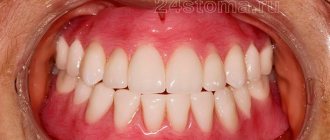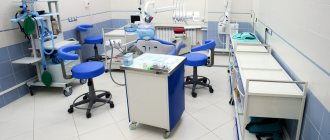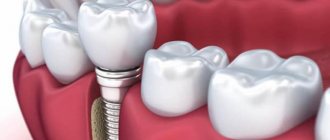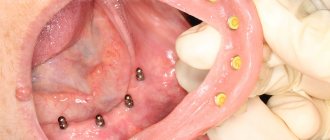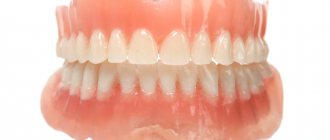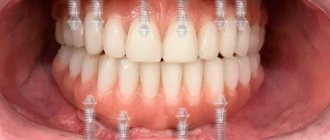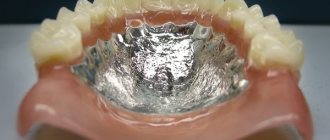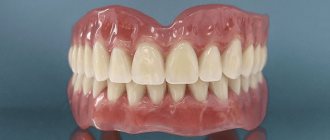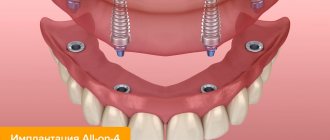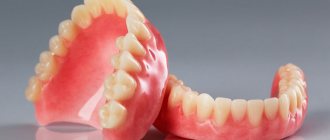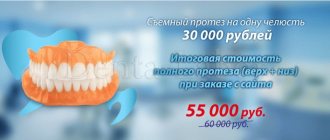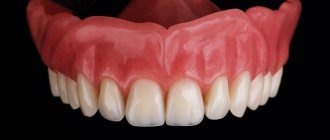Trauma, poor oral hygiene, dental diseases or their unfair treatment, as well as metabolic disorders and vitamin deficiencies can lead to tooth loss - adentia. In some cases, it may be a congenital pathology.
But do not despair, with the help of modern treatment methods, everyone can regain a beautiful smile and regain their former quality of life.
Complete dental prosthetics
In the classical sense, complete jaw prosthetics implies the presence of complete edentia, that is, when not a single tooth remains. Fixation of the prosthesis in the absence of teeth is carried out using implants or special suction cups located on the base of the removable denture.
Dental prosthetics in cases of complete absence of teeth are divided into three large categories.
- Removable dentures can be removed without assistance.
- Fixed - installed with support on dental implants.
- Conditionally removable - removed using professional tools by a dentist.
Prosthetics using removable and partially removable dentures
Complete removable dentures are used when all teeth are missing, and partial dentures are used when several are missing.
The finished orthopedic design should:
- It is firmly fixed in the oral cavity, performs a chewing function, and is aesthetic.
- Have no pores or roughness.
- Do not have a negative effect on the mucous membrane.
- Do not injure cheeks, tongue, lips.
It is important to note that all prostheses have a period of adaptation (getting used to) to it. The longest adaptation period is for acrylic ones (up to a month), the shortest for nylon and clasp ones (several days).
Prosthetics are always carried out over several visits and take several weeks. As a result, the patient receives not only a beautiful smile, but also fully restored chewing.
Types of complete dental prosthetics
Implantation today is an advanced method of restoring teeth, including those with complete edentia. Purely theoretically, it is possible to replace every lost tooth with implants, but such a procedure will cost enormous amounts of money, which in general is not entirely justified. Specifically for the diagnosis of complete edentia, clinicians have developed a number of concepts that allow the installation of a fixed prosthesis on a certain number of implants. Complete prosthetics of the upper jaw more often require osteoplastic surgery (compared to the lower jaw), since the bone here is less dense and voluminous.
Complete fixed dental prosthetics
All-on-4 (all on four)
Concepts of complete fixed dental prosthetics on 4 implants. The technique was developed by a well-known manufacturer of implantation systems - Nobel Biocare.
All-on-6 (all on six)
Method of complete fixed dental prosthetics using 6 implants. Considered a more reliable option than All-on-4.
Complete mandibular prosthesis Trefoil
The Trefoil concept is also from Nobel Biocare. The technique involves the use of only three implants and a special beam platform. However, the technology is used only when it is necessary to carry out complete prosthetics of the lower jaw. Due to anatomical features, upper dentures with complete absence of teeth must rest on at least four implants.
ReSmile
"ReSmile®" is a comprehensive solution for restoring chewing function in cases of complete absence of teeth and severe lack of bone tissue. The concept involves the restoration of all teeth with a complete fixed prosthesis on cement or screw fixation (14-16 teeth) with the rapid restoration of all functions of the jaw (chewing, swallowing and others), as it is carried out without incisions in the gums by puncture. Re-prosthetics are not required with this method.
ATTENTION!
As a temporary option for more reliable fixation of the prosthesis, mini-implants can be used. They are easy to install and do not require large amounts of bone.
Prosthetics with complete removable dentures
The option of fixed prosthetics is only possible with the installation of intraosseous dental implants. If this is not feasible, it makes sense to pay attention to removable prosthetics. These are products with a soft base and artificial teeth that copy the gums and the visible (crown) part of the teeth.
Acrylic
Prostheses made from special plastic. Suitable for complete prosthetics of the lower jaw and upper jaw due to good load distribution. Dentures are uncomfortable, promote the accumulation of bacteria, and the material itself can cause allergies.
Nylon
Good fixation, moisture resistance, hypoallergenicity and comfort are the qualities that make nylon prostheses worth paying attention to. On the other hand, they distribute pressure worse when chewing and sag over time (the bone tissue under such a prosthesis atrophies faster).
The best removable dentures for complete absence of teeth should be hypoallergenic, distribute the load well and not cause serious discomfort when worn.
Types of edentia
Adentia is the absence of teeth in the oral cavity. There are several types:
- Primary: when the patient initially did not have a permanent or baby tooth germ.
- Secondary: the tooth erupted, but after some time was removed (due to injury or caries and its complications).
Also distinguished:
- complete edentia: all teeth in the mouth are missing;
- partial (incomplete): one or more were removed.
Treatment and dental prosthetics are carried out only after diagnosis. It is important for the doctor to assess the condition of the gums and bone tissue. The treatment and prosthetic plan will depend on this.
The best dentures for complete absence of teeth
Many patients ask the question, which dentures are better for complete absence of teeth? On the one hand, the answer here is obvious. The best dentures for complete absence of teeth are placed on implants. It is titanium roots that prevent bone tissue loss, provide the necessary stability of the structure, distribute the chewing load as efficiently as possible and allow you to achieve good aesthetics. However, implantation cannot be performed in all cases, since the procedure has a list of contraindications and is not cheap. The cost of complete dental prosthetics can cost more than half a million rubles, and this is far from the limit. The Trefoil concept will be cheaper, but it has a significant limitation (it is impossible to carry out complete prosthetics of the upper jaw teeth).
Prosthetics on all-on-4 implants
The all-on-4 prosthetic technology was developed by the famous dental brand Nobel about 20 years ago and has become one of the optimal options for dental restoration for people facing the problem of complete edentia.
The key feature of all-on-4 is that to carry out prosthetics and secure a fixed prosthesis, only four dental implants need to be implanted. Due to the number of implants used in the operation, the technology got its name - “all on four”. The use of a small number of implants reduces the trauma of the surgical intervention stage and allows for dental restoration in the shortest possible time. The stability of the position of the prosthesis in the oral cavity is ensured by the special arrangement of the implants: during all-on-4, artificial roots are implanted according to a scheme specially developed for this protocol.
The implantation scheme ensures their reliable primary stability and makes it possible to immediately load the implants with a prosthesis. A temporary acrylic prosthesis is attached to the installed implants within a few hours after the main operation. Immediate installation of a prosthesis helps relieve the patient from psychological and physical discomfort: you will be able to smile without embarrassment and eat almost any food. Loading with a prosthesis also has a positive effect on the rate of implant healing.
TAKE NOTE: A removable denture on implants is placed temporarily - until the healing process of the implants is completed. When the implanted implants fuse with the jaw bone, the temporary plastic prosthesis is replaced with a permanent structure, which can be made from any material - ceramics, zirconium.
Who can be recommended for all-on-four prosthetics?
This denture option is suitable for people who have lost all their teeth in a row. The “all-on-four” prosthetic technique is also used when the remaining teeth in the mouth have to be removed: for example, if they are severely damaged and it is impossible to treat them and restore them with fillings.
When is it impossible to restore teeth with all-on-4 prosthetics?
Implantation using any of the technologies is a serious surgical intervention, therefore, naturally, there will be contraindications to it.
All-on-4 prosthetics are not performed if the patient has autoimmune diseases, pathologies that cause bleeding disorders, or some types of chronic general diseases of the body. You should be advised in detail about contraindications to all-on-4 prosthetics by an implantologist during your initial consultation before treatment. Moreover, the implantologist’s task will be to completely eliminate all possible contraindications, and this requires the most detailed diagnostics. TAKE NOTE: Some people think that diagnosis is the simplest and most insignificant event when preparing for implant prosthetics. But this is a dangerous misconception, because the results of treatment will depend on the quality of diagnosis before implantation and prosthetics! Based on diagnostic data, contraindications are excluded, treatment is planned, implants and areas for their implantation are selected, and prosthetic material is selected. Therefore, it is so important that the clinic where you go for dental treatment has modern diagnostic equipment and experienced, responsible doctors who understand the importance of high-quality diagnostics!
One of the contraindications to all-on-four prosthetics is severe atrophy of the jaw bone tissue. If a clear bone deficiency is diagnosed in the upper jaw, then the problem can be solved by installing special zygomatic implants, but atrophy of the lower jaw bone will require preliminary osteoplasty.
How will the prosthetics work?
Treatment will begin with a visit to the clinic and a series of diagnostic tests.
If diagnostics do not reveal contraindications to this prosthetic technology, then a detailed operation plan is developed, implants are selected, and the exact locations for their installation are determined. TAKE NOTE: When the all-on-4 prosthetic technology first appeared, it used exclusively Nobel brand implants. Over time, implantation systems that can be used for all-on-four implantation have appeared in the lines of other brands.
Contraindications
Despite the fact that a person with a toothless mouth feels inferior and wants to get rid of the defect, it is not always possible to restore the dentition. Absolute contraindications to prosthetics are:
- allergy to material components;
- oncology;
- poor blood clotting;
- excessively low weight;
- severe diabetes mellitus;
- intolerance to anesthesia.
Relative contraindications include exacerbation of mental illness and viral infection. As soon as the patient recovers, full prosthetics begin.
How does the prosthetics process work?
The entire procedure consists of the following steps:
- Examination by a dentist, development of a treatment strategy.
- Taking an impression using dental instruments and special material.
- Checking the relationship of the jaws, the comfort of using dentures depends on this.
- Taking functional tests to form an impression. Based on the result, a wax frame is produced, which the patient can check.
- Installation and correction of the prosthesis after several days of use.
Advantages of nylon prostheses
- Soft and pliable material, adheres to the jaw,
- The prosthesis does not rub;
- The product does not require long-term habituation;
- The prosthesis can be made in the shortest possible time;
- A high-quality nylon denture is invisible in the mouth and adequately performs the chewing function;
- There are no metallic inclusions, which means it is suitable for patients with allergies to metals;
- To secure the product in the oral cavity, a special adhesive composition or design can be used
- Fixed by suction to the mucosa.
Examples of work “Before” and “After”
Basal implantation of both jaws with complete edentia
Case: the patient complained of missing teeth in the upper jaw, in the area of chewing teeth in the lower jaw, as well as mobility and pain when chewing in the area of the front teeth in the lower jaw.
Basal implantation of ROOTT with complete edentia
Case: destruction and absence of chewing teeth, destruction of frontal teeth under crowns, atrophy of bone tissue and gums due to periodontitis.
Prosthetics on implants
If the patient’s budget and health condition allow for minimally invasive surgery, it is better to opt for implant prosthetics.
There is no need to install 28 units of titanium rods separately. In some cases, patients are offered the installation of 4-6 implants on each row and fixation of solid prostheses on them. Advantages of installing dentures on implants
- Reliability – the prosthesis on the implant is held as firmly as your own living tooth with roots.
- Aesthetics – dentition restored in this way pleases with its natural appearance and beauty.
- Ease of chewing
- Durability – the guarantee for implants is determined by the manufacturer at the level of 10-50 years. It is enough to choose the right prosthesis and forget about problems with missing teeth for several decades.
- Possibility of replacing dentures - if the coronal part is destroyed, you can always install a new denture on the metal root.
The disadvantages of the method include the presence of contraindications and higher cost compared to prosthetics without implants.
Questions and answers
Please tell me how much basal implantation will cost in my case?
Good afternoon I am 51 years old and completely edentulous. Please tell me how much basal implantation will cost in my case? Thank you.
Hello! The cost of complex basal dental implantation ROOTT in case of complete absence of teeth is 550,000 rubles. The price includes all manipulations for installing implants, metal-plastic prostheses, further examinations and corrections, and a guarantee. If there are any unremoved tooth roots remaining, then their removal in one step before implantation will also be included in this cost. In order to find out whether dental implantation is indicated for you, you need to undergo an examination. In our clinics, you can undergo an oral examination and get a consultation with an implant surgeon for free; based on the results of the consultation, a treatment plan will be drawn up with all possible options for restoring teeth in your case. To make an appointment, call us at +. Best regards, SIMPLADENT Patient Support Center + + 8
Other questions
Other jobs
